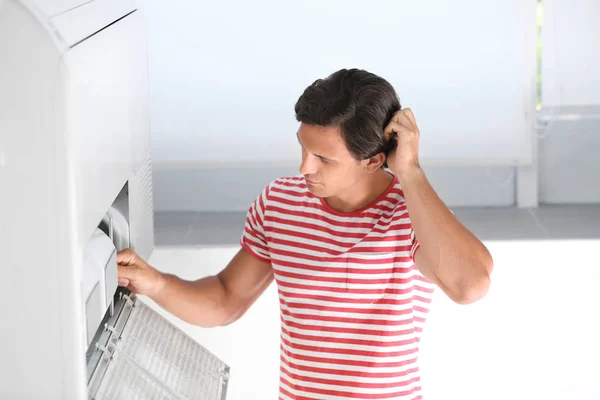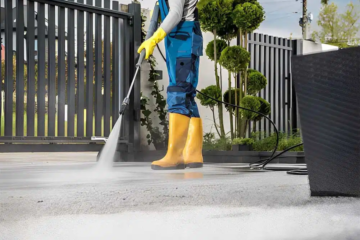Have you ever had your air conditioner stop working on a hot day, leaving you sweating and frustrated? A broken air conditioner can be a real headache, especially during the summer months when you need it most.
Understanding why your AC breaks down can help you prevent it from happening in the future. In this blog, we’ll walk you through the most common causes of a broken air conditioner and give you tips on how to avoid these issues.
By the end of this guide, you’ll know what to watch out for and how to keep your AC running smoothly.
Clogged Filters
One of the most common causes of air conditioner problems is a clogged filter. The air filter in your AC system is designed to catch dust, dirt, and other particles before they can enter your home. Over time, these filters can become clogged if they are not cleaned or replaced regularly.
When the filter is blocked, air can’t flow properly, which puts extra strain on your system. This can cause your AC to work harder than it should, leading to overheating and even breakdowns.
To prevent this, make sure you check and change your air filters regularly. A good rule of thumb is to replace or clean the filter every 1 to 3 months, depending on how often you use your AC. Keeping the filter clean not only prevents breakdowns but also helps your air conditioner run more efficiently, saving you money on energy bills.
Refrigerant Leaks
Refrigerant is the substance that cools the air inside your air conditioner. If your AC is low on refrigerant, it can’t cool your home properly, and this can lead to bigger issues.
One of the main reasons for a broken air conditioner is refrigerant leaks. When the refrigerant leaks out of the system, your AC loses its ability to cool, and the system may start to overheat.
Refrigerant leaks can be tricky to detect on your own, so it’s important to call a professional if you notice your AC isn’t cooling as well as it used to. They can check for leaks and refill the refrigerant if needed. Regular maintenance and inspections can also help prevent refrigerant leaks from becoming a bigger problem.
Electrical Issues
Electrical issues can also cause your air conditioner to stop working. Worn-out wiring tripped breakers, or a malfunctioning compressor can all lead to electrical problems in your AC system. Sometimes, these problems are due to wear and tear over time, but they can also happen if the system is not properly maintained.
One way to prevent electrical issues is by scheduling regular maintenance with a trusted technician. They can check the wiring and other electrical components of your AC to make sure everything is working correctly. This can help catch small problems before they turn into bigger, more expensive repairs.
Thermostat Problems
Sometimes, the problem isn’t with the air conditioner itself but with the thermostat. A broken or faulty thermostat can cause your AC to turn on and off at the wrong times or not at all. If your air conditioner isn’t cooling your home to the right temperature, the thermostat could be to blame.
To prevent thermostat problems, make sure it’s set to the correct temperature and that it’s working properly. If your thermostat is old or malfunctioning, consider upgrading to a newer model. Smart thermostats, for example, can help you control the temperature in your home more easily and make sure your AC is running as efficiently as possible.
Drainage Issues
Air conditioners remove moisture from the air as part of the cooling process. This moisture needs to drain out of the system properly, usually through a drain line.
However, drainage issues can occur when the drain line becomes clogged or blocked. When this happens, water can back up into the system, causing leaks, water damage, and eventually a broken air conditioner.
To prevent drainage issues, make sure the drain line is clear and free of debris. You can check this yourself by looking for any water pooling around your AC unit or inside the house. If you notice any signs of drainage problems, it’s best to call a professional to clear the line and check for further damage.
Frozen Evaporator Coil
A frozen evaporator coil occurs when the refrigerant inside the coil becomes too cold, causing moisture from the air to freeze on the coil’s surface. This issue can lead to reduced airflow, inefficient cooling, and even damage to the air conditioning system.
Common causes include low refrigerant levels, restricted airflow due to dirty filters, or malfunctioning components like the blower fan. To address a frozen evaporator coil, it’s essential to turn off the system, allow the ice to melt, and identify and fix the underlying issue.
The Importance of Regular Maintenance
Now that you know some of the most common causes of a broken air conditioner, you might be wondering what you can do to keep your AC in top shape. The answer is regular maintenance.
By scheduling regular check-ups and cleaning with a professional AC technician, you can catch problems before they become major issues. Regular maintenance can also extend the life of your air conditioner and keep it running efficiently.
While some tasks like cleaning filters and checking thermostats can be done yourself, other issues might require professional attention. AC Services can offer expert help for complicated repairs and thorough maintenance.
Engaging professionals ensures that your air conditioner remains in top condition for longer. It extends the life of your unit and keeps it running hassle-free.
Prevent a Broken Air Conditioner by Following This Guide
A broken air conditioner can be avoided if you take care of your system and know the common issues to watch out for. From clogged filters and refrigerant leaks to electrical issues and thermostat problems, staying on top of regular maintenance is key.
By addressing these issues early and keeping your AC well-maintained, you can enjoy a cool and comfortable home without the stress of sudden breakdowns. Regular check-ups not only enhance efficiency but also extend the lifespan of your unit. Invest in a professional inspection yearly to ensure optimal performance.
Did you like this guide? Great! Browse our website for more!
Keep an eye for more latest news & updates on Gossips!




